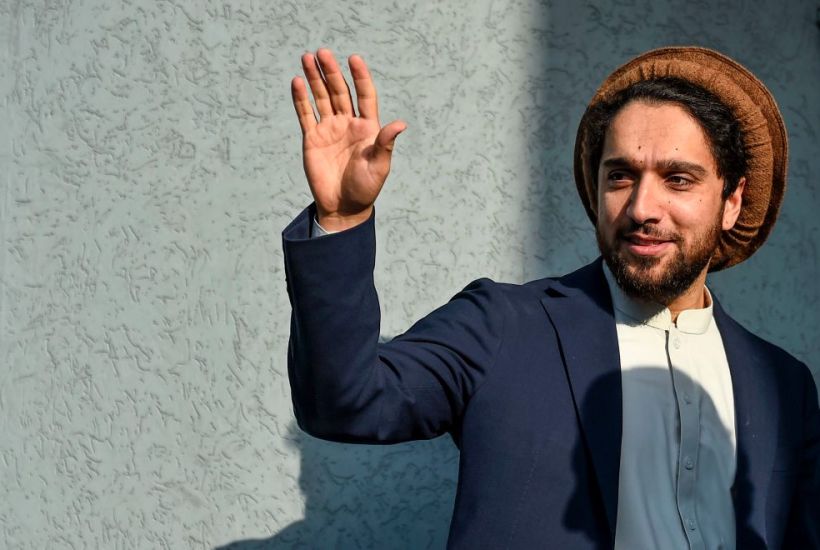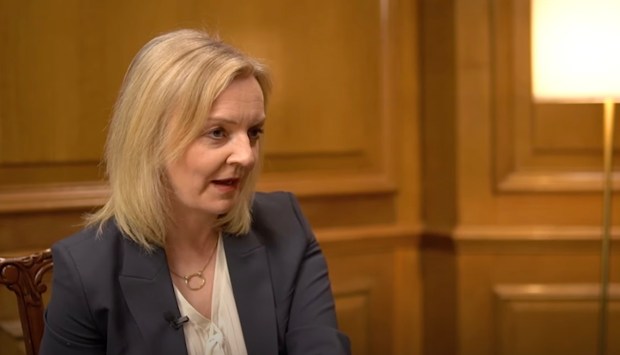Fighting has continued against the Taliban in Afghanistan while the world has not been watching. The commander of the main opposition force, Ahmad Massoud, began with 643 fighters after the fall of Kabul in August 2021, and now claims to have a force of 5,000 across six provinces in a belt in the northeast of the country.
In a rare meeting in Tajikistan, where he commands remotely from across the northern border of Afghanistan, the 34-year-old resistance leader told me that western countries are making a mistake by trying to engage with the Taliban.
Massoud inherited the mantle of resistance leader from his father, the legendary guerrilla commander Ahmad Shah Massoud, who was killed in an al Qaeda terrorist attack two days before 9/11. The younger Massoud wears a flat wool pakhool hat on his head, in a manner made famous by his father, along with light beige shirts and trousers and a dark olive green jacket in a version of combat clothing.
He said that any illusions that the Taliban had changed from the past should have gone by now amid the violence and repression of their rule. They have set up thousands of madrassas where young boys spend hours a day under religious instruction, learning the Quran by rote. ‘If this goes on it will produce a brainwashed generation,’ he said. ‘Today Afghanistan is a training centre for terrorists and a prison for the people.’
Massoud inherited the mantle of resistance leader from his father, the legendary guerrilla commander
There is no international support for recognition of the Taliban regime, because of their repression of women and failure to adhere to the rule of law. But a number of countries, notably India, Pakistan, China, and Russia, now have an active diplomatic presence in Kabul. While not opening a mission or moving towards recognition, there have been signs that the US would be willing to engage with the Taliban in counterterrorist efforts against more extremist groups such as Islamic State. To Massoud this would be a mistake. He said that the Taliban and Islamic State fighters ‘are two sides of the same coin.’
The most recent detailed UN report on Afghanistan said there are ‘local-level, pragmatic, transactional dealings’ between the two, although no evidence of a strategic alliance. The two groups have different Islamic traditions, with the Taliban supporting the Hanafi school, while Islamic State are more extreme Salafists. The Taliban have not prevented, and may have facilitated, Islamic State attacks on members of the Shia Hazara minority, including an attack on a girls’ school in October.
As far as other international terrorist groups are concerned, the Taliban’s close links with al Qaeda were clear even before the al Qaeda leader Ayman al-Zawahiri was identified and killed while staying in central Kabul. The Islamic Movement of Uzbekistan have also entrenched themselves in Afghanistan since the Taliban retook power, as have the anti-Chinese East Turkestan Independence Movement. And the ‘Pakistani Taliban,’, the TTP, have become far stronger inside eastern Afghanistan. Massoud said that Pakistan’s military intelligence, the ISI, still have more interest in conflict than stability. ‘The ISI,’ he said, ‘has made millions of dollars in the business of blood.’
Massoud said that he had learnt during his time doing War Studies at King’s College London that war often does not end with outright military victory. He said there should be a ‘meaningful national dialogue’ with the Taliban. But they need to be put under significant pressure first. ‘We are Muslims too,’ he said. ‘The Taliban don’t respect Islam. They want only one thing – surrender.’
There are other potential military forces willing to take up arms against the Taliban, although the dislocation of the collapse, which scattered prominent Afghans across the globe, has made both political and military organisation difficult. Major General Sami Sadat, a former special forces commander, who also commanded in Helmand, has said that he would potentially return to fight against the Taliban. But like Massoud, he faces the challenge of raising resources. Afghanistan is not short of weapons, and there are growing signs both of splits in the Taliban and public anger at the collapse of the economy and repression, making it easier for opposition forces to recruit soldiers. But war demands a constant flow of fuel and ammunition, and there are, as yet, no international backers willing to provide support for that.
Massoud is in touch with a number of different Afghan opposition leaders, including Sadat, and also with former soldiers and intelligence officials from the ousted government of the Afghan republic who are still inside the country, recognising that if his forces move beyond the mountains to take and hold some centres of population, they will need to fill a power vacuum quickly.
But there is no articulated vision for the kind of country that might then emerge. It is easy to agree that the Taliban should go, and furthermore that Afghanistan should be a sovereign, independent, Islamic country that poses no threat to its neighbours. But there is no agreement on what next, what kind of constitution and government would work. ‘Democracy’ earned a bad name because of the corruption and state failure of the ousted administration of President Ashraf Ghani. But no one has yet come up with a workable alternative.
Massoud could share little detail on his preferred arrangement, beyond saying that ‘one person could not unite the country,’ but there is no mechanism to deliver consensus on what might come next if the opportunity arose. Massoud’s forces are principally from the Tajik minority, and seen by some Afghans as ethnically divisive. All of the Taliban leadership are Pashtuns – the largest minority in the country. The multifaceted tribal makeup of Afghanistan is both a glorious part of its heritage, and the biggest challenge to stability without a clear direction, as every group wants a share of the cake.
The enduring nightmare is a return to 1992, when mujahidin guerrilla groups, (including one led by the elder Massoud) fought over the spoils in a vicious civil war after defeating the Russian-backed government in Kabul. If the west, and in particular America, really want to serve the cause of stability and reduce the chances of Afghanistan once again becoming a haven for international terrorism, they would do better to concentrate on what might come next if Taliban power were to be loosened, instead of pursuing any illusion that the Taliban might become more pliable.
The post Afghanistan’s guerrilla generation: an interview with Ahmad Massoud appeared first on The Spectator.
Got something to add? Join the discussion and comment below.
Get 10 issues for just $10
Subscribe to The Spectator Australia today for the next 10 magazine issues, plus full online access, for just $10.



















Comments
Don't miss out
Join the conversation with other Spectator Australia readers. Subscribe to leave a comment.
SUBSCRIBEAlready a subscriber? Log in